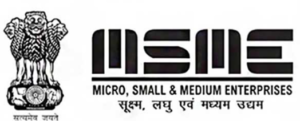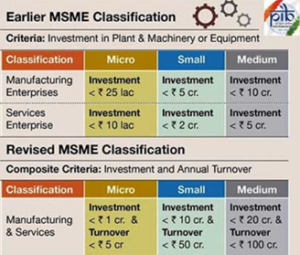Private labels offer Indian MSMEs an export pathway.
Relevance
- GS Paper 3 Indian Economy and issues relating to planning, mobilization, of resources, growth, development and employment.
- Inclusive growth and issues arising from it.
- Tags: #indianeconomy #MSME #privatization #currentaffairs #upsc.
Why in the News?
- The share of MSMEs in exports has declined from 49.4% in 2020-21 to 43.6% in 2022-23.
- India’s strategic focus on integrating Micro, Small, and Medium Enterprises (MSMEs) into global value chains, as emphasized in G20 meetings and the Foreign Trade Policy 2023, is a commendable move.
- The MSME sector is a major contributor to India’s economy, constituting 29.2% of GDP and 36.2% of manufacturing output in 2021-22. However, In light of the global economic outlook, MSME exports are facing challenges.
Private Labels: A Pathway to Boost MSME Exports
- In the uncertain global landscape, the role of MSMEs as drivers of India’s growth and employment cannot be underestimated. To enhance their productivity, promote exports, and augment their contribution to the Indian economy, several strategies can be explored.
- One promising avenue is the expansion of private label sourcing from India. Private label products, manufactured by third parties (often MSMEs) for retailers or e-commerce companies to sell under their own brand names, present a significant growth opportunity.
- India remains underrepresented globally, and policy support can facilitate increased exports through private labels.
Rising Demand for Private Labels
- The private label market in India is on the rise, driven by the growth of organized retail formats, both physical stores and online platforms. This trend is fueled by consumer preferences for high-quality, affordable products.
- With increasing disposable incomes, consumers are transitioning from unbranded to branded products, creating a niche for private labels as cost-effective alternatives. Retail giants like Shoppers Stop, Reliance Retail, Spencer’s, Ajio, Amazon, Big Basket, Nykaa, Flipkart, Pepperfry, and Tata CliQ have successfully expanded their private label offerings, providing consumers with more choices.
- Private labels have thrived across various categories, from food and apparel to cosmetics, with some segments, like online beauty and personal care, seeing private labels’ market share exceed 12%.
- This transformation in consumer shopping habits not only benefits consumers but also offers a lifeline to MSMEs by addressing challenges like building brand appeal and reaching customers in a competitive business environment.
Empowering MSMEs and Enhancing Revenue
- Private labels play a vital role in empowering MSMEs by increasing their revenue. Collaborating with private labels reduces MSMEs’ reliance on a single product line or a limited customer base, leading to greater financial stability.
- MSMEs can also lower marketing costs by leveraging established retailer channels and customer bases, facilitating domestic and global expansion, resource-efficient growth, and innovation.
- By producing private label products, small businesses can tap into large retailers’ established supply chains with broad market reach, potentially securing exclusive supply deals and reducing competition.
- These advantages provide MSMEs with revenue stability and access to financing, contributing to improved global competitiveness and bolstering India’s reputation as a manufacturing and sourcing hub for global brands.
Challenges and Regulatory Considerations
- While the private label pathway offers numerous benefits, concerns arise regarding consumer protection, especially related to fake and deceptive reviews of private-label products online.
- India lacks specific regulations governing private labels, but various existing regulations, such as the Legal Metrology Act, cover labeling rules and norms for private labels.
A Well-Designed Regulatory Framework
- A well-designed, transparent regulatory framework should address gaps in existing regulations, including those related to the Consumer Protection (E-Commerce) Rules 2020, unfair trade practices, and dispute resolution mechanisms.
- These overlapping regulations hinder business ease and the integration of MSMEs into global value chains through e-commerce platforms.
- Such a framework should prioritize transparency, clarity, competition, non-discrimination, and a level playing field between store and non-store formats, ultimately expanding the reach of Indian MSMEs in both domestic and global markets.
Government-Industry Collaboration
- To meet current demands, it is imperative for the government and companies to collaborate in onboarding more MSMEs onto e-commerce platforms.
- Aligning these efforts with G20 objectives and India’s Foreign Trade Policy 2023 will not only enhance MSMEs’ presence in the domestic market but also strengthen their integration into global value chains.
- A limited perspective could hinder export growth, so it is essential to explore all opportunities that the world offers to Indian MSME manufacturers.
To ensure the healthy growth of MSMEs using e-commerce platforms, it is essential to strike a balance between regulation and fostering entrepreneurship. Clarity in the roles and responsibilities of sellers and marketplaces is necessary in India’s e-commerce rulebook. Overly restrictive clauses prohibiting companies from selling their private label products could hinder MSME growth. Therefore, a balanced regulatory approach is crucial.
| Government schemes for MSMEs in India
1. Prime Minister’s Employment Generation Programme (PMEGP): This scheme provides financial assistance to unemployed youth to set up their own micro-enterprises. 2. Credit Guarantee Scheme for Micro and Small Enterprises (CGTMSE): This scheme provides credit guarantee to MSMEs to facilitate their access to loans from banks and financial institutions. 3. Micro & Small Enterprises Cluster Development Programme (MSE-CDP): This scheme aims to develop clusters of MSMEs to improve their productivity and competitiveness. 4. Scheme of Fund for Regeneration of Traditional Industries (SFURTI): This scheme aims to revive and develop traditional industries. 5. Entrepreneurship and Skill Development Programme (ESDP): This scheme aims to develop entrepreneurial and managerial skills among MSMEs. 6. Assistance to Training Institutions (ATI) Scheme: This scheme provides financial assistance to training institutions to train MSME entrepreneurs and workers. 7. Skill Upgradation and Mahila Coir Yojana (SUMCY): This scheme aims to upgrade the skills of coir workers, especially women. 8. Procurement and Marketing Support (PMS) scheme: This scheme provides assistance to MSMEs to participate in exhibitions and trade fairs. 9. International Cooperation (IC) Scheme: This scheme provides assistance to MSMEs to participate in international trade fairs and exhibitions. 10. National SC-ST Hub: This scheme provides assistance to SC/ST entrepreneurs to set up and run their businesses. 11. A Scheme for Promoting Innovation, Rural Industry & Entrepreneurship (ASPIRE): This scheme aims to promote innovation and entrepreneurship in rural areas. |
Sources: Livemint
Mains Question
“In the context of India’s MSME sector and its role in global value chains, discuss the significance of private label exports as a growth strategy. Highlight the benefits for MSMEs and challenges in this approach. Additionally, elaborates on the regulatory considerations and the need for a well-designed framework to foster private label growth. 250words.





